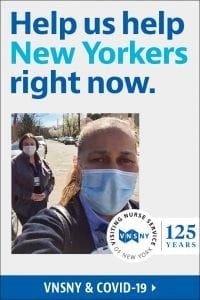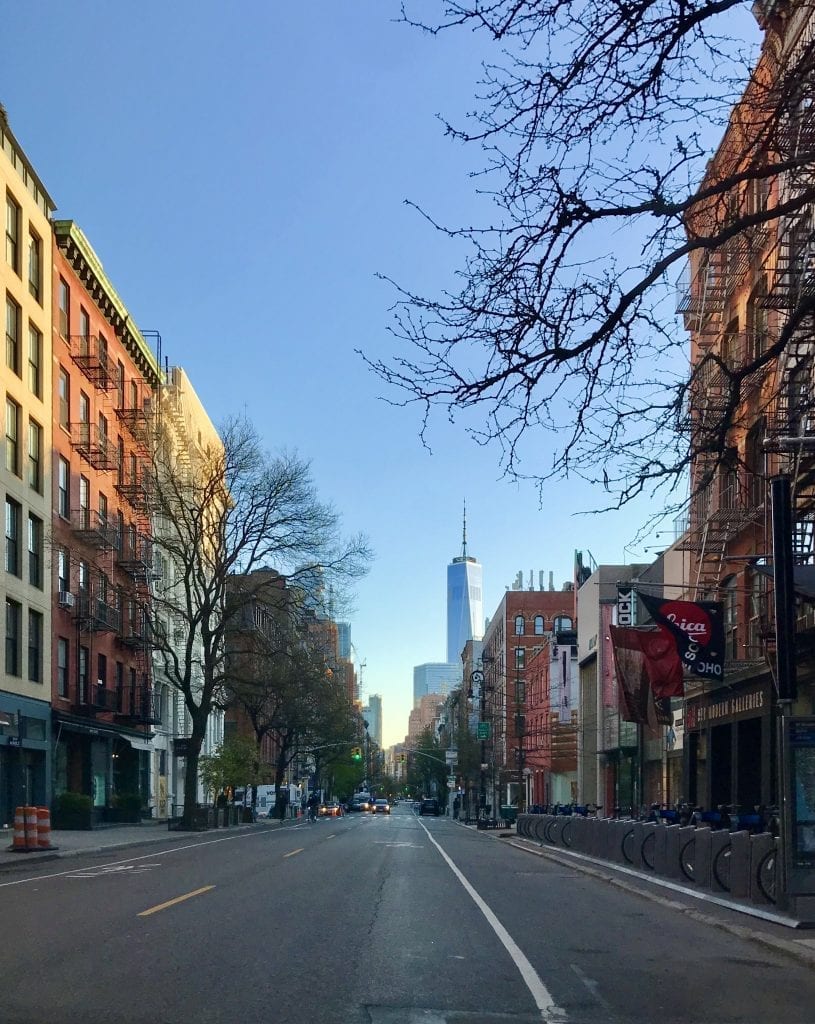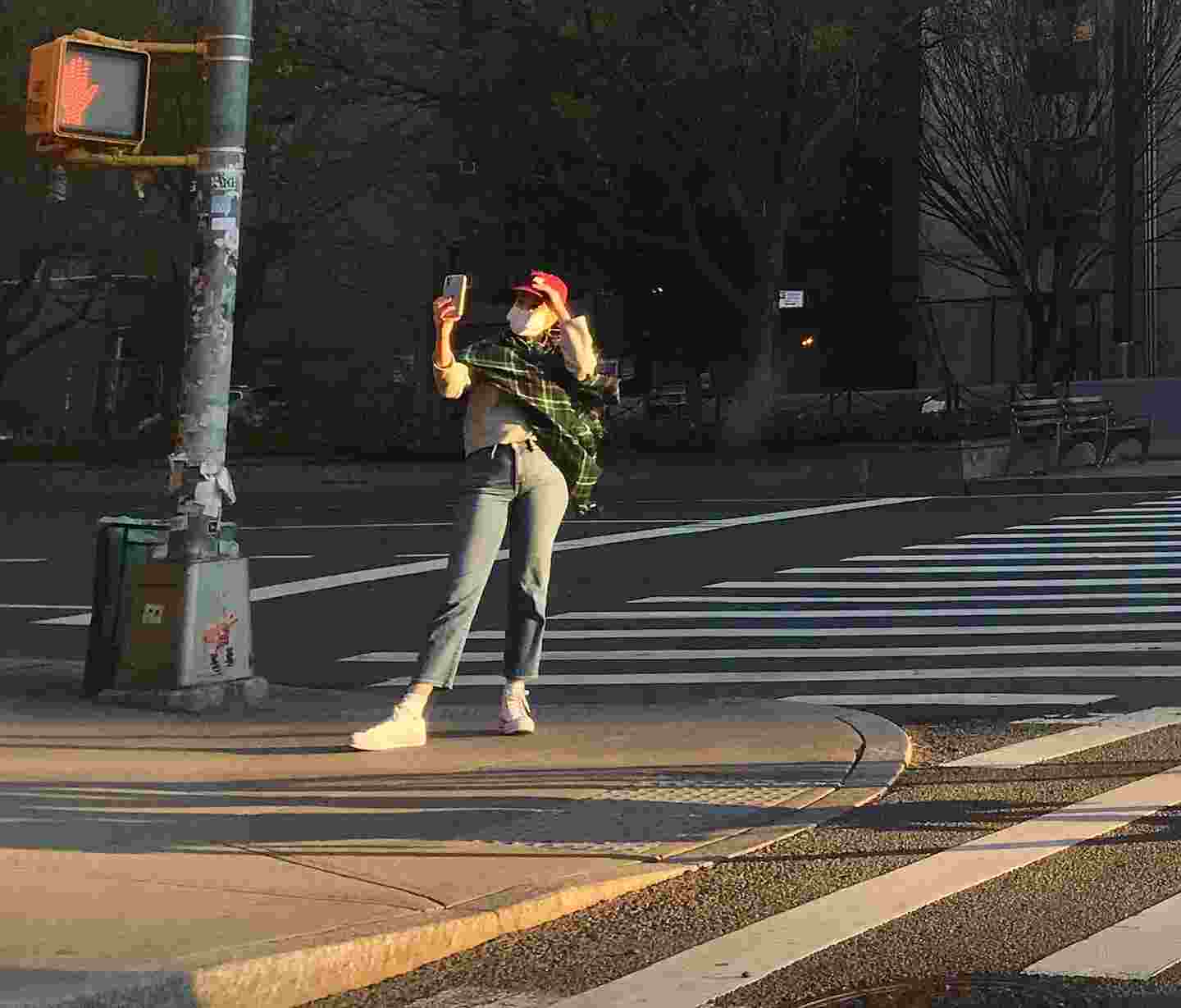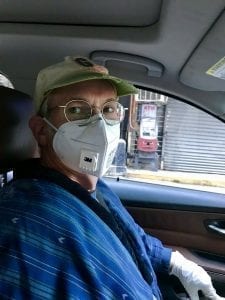Brooklyn
His office, normally bustling with patients, is empty. My doctor and I sit opposite one another in Examination Room 1. He awkwardly adjusts an ill-fitting surgical mask over his gray beard as our unusually leisurely conversation drifts from my health to the pandemic and to death. His good friend is dead, another friend just recovered despite having had to go on a ventilator.
“Who would have thought we would find ourselves here?,” he asks. “My friend, the doctor who died of COVID-19, was the nicest guy you could imagine. It’s as if this virus selects for kindness.” His is the guilt of those left living. Maybe that’s why he’s still working, helping patients like me despite not having proper protective gear. He could retire, but he’s doing what he trained for, what he’s done all his adult life, even if now it might kill him.
VNSNY

As I check the virus map each day in the New York Times, it’s hard to comprehend the sadness this data illustration represents. The numbers grow, adding zeros. Behind each zero are thousands of individual names, fascinating stories, dearly held passions, truncated hopes, an end to the delicate ripples each human life sends out into the world.
New York Today

The emptiness and quiet of the city was striking and unnervingly sad. Stores and restaurants shuttered, some boarded up; streets empty; a masked woman standing alone on the corner of Sullivan Street taking selfies in the dying rays of the sun—funny, but sad too. Further uptown, tall apartment buildings looking forlorn, full, one would presume, of New Yorkers bereft of the usual springtime pleasures and of work, or—as ill fortune might dictate—of a loved one.
Past clients started reaching out this week for help as they rethink their business strategies. It’s gradually settling in that there will be no snap back to normal. People are going to continue to die; this summer will be like none we can remember. This virus will haunt us for years, and we are beginning to change.
We are only at the end of the beginning of a very long game with rules that are cruel and unfair.
Hope
The loneliness, frustration and grief will maybe make us better, maybe it will temper our callousness and inattention. I’m sad for New Yorkers, but I’m proud of us too. We have so much, and sometimes it seems we can’t really be bothered to see the value of what’s out beyond the confines of our great city. We act like the woman on Sullivan Street, aglow in the last light of our capitalist glory, looking mostly admiringly at ourselves. But now we suffer, and what we suffer from is coming soon to every corner of America.
The nicest people we can imagine will die. They will mostly die alone away from families and loved ones because they cannot breathe. Their last needs, last fears, last words will be attended to by dedicated, compassionate, and overworked strangers, including nurses, doctors, health aides, administrators, and cleaning personnel—the angels of this moment.
This is a very sad day for me, for New York, and for America. We can do better. We can grow up. We can learn what it’s like to be kind and not just proud. We can be honest, fair, and more thoughtful. Maybe this plague will help us all adjust our moral compass a bit. Maybe it won’t, but I still have hope.
New Yorkers give me hope.
——
If you would like to help the Visiting Nurse Service of New York (a nonprofit organization) obtain the protective gear they need for their thousands of nurses, therapists, and home health aides working on the front lines in New York please visit this page.




That is really intense and accurate James.
I find it difficult and extremely depressing to go outside. This city birthed me and raised me and to see it a shadow of itself is just too much to deal with emotionally. Empty streets and shuttered stores is not New York. Going out at 10:30 on a Saturday night, on an errand of mercy, should not make feel creeped out on 3rd Avenue in Gramercy Park. Yet it is just me, and one other person who did not appear homeless between 18th and 14th streets and back.
That would be prime time for dating couples to be returning from dinner and not yet completely drunk and rowdy youth to be on their way to being both. There is not supposed to be a morgue truck on Second Avenue. There is supposed to be baseball in the Bronx.
Some say that the nadir of New York coincided with my personal “glory days,” the 70s and 80s. Or it came on 9/11.
September 11, 2001 was sad to be sure, it was also anger. It was anything but defeat. Today, you wonder how many of shuttered stores and restaurants will reopen. You wonder if the young adults not wearing masks are potentially infected, or going to be, and will pass the virus on to someone more vulnerable.
You wonder if New York is defeated. But VNSNY most definitely isn’t. So I stay home and work.
Blessings, James. Just the right tone to connect us to what this virus feels like for some who are not sick.
Thank you Jim
James,
Your observations, compassionate perspective and willingness to maintain a positive view is exactly what every American needs to embrace. While we have never experienced anything like this in our lifetime(s) we need to remember that our parents and grandparents endured much more in their lifetimes. Their strength and the values they passed to us will enable us to get through this. Most importantly we need to remember that we are all in this together. We as a nation must come together and lock arms with our neighbors, other Americans and all of the nations of the world. Putting aside our differences and responding with compassion and care will enable us to persevere. While everyone has been worn down by the different lockdowns, rules and changes we need to step back and realize how fortunate we have been. The threat of this virus is real and we do not have a clear idea of how it impact us over the coming months. That is why scientists and medical specialists are calling for caution as we try and ease back to some form of normality. Going forward we need to adopt and embrace the change we face. What does easing back mean?
Evade the virus
Adapt to the changes
Survive the impacts
Endure and improve
Healthy @ Home